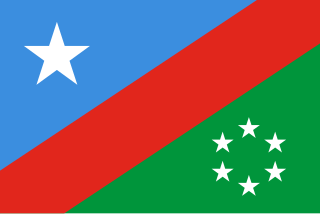
The South-West State of Somalia, is a Federal Member State in southwestern Somalia. It was founded by Hasan Muhammad Nur Shatigadud, leader of the Somalia RRA on 1 April 2002. It was the third autonomous region to be established.

Barawa, also known as Barawe and Brava, is the capital of the South West State of Somalia. It functions as a port town in the southwestern Lower Shebelle region of Somalia. Facing the Indian Ocean, Barawa serves as the main port of the South West State.
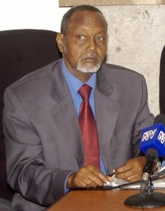
The Rahanweyn, also known as the Digil and Mirifle are a major Somali clan. It is one of the major Somali clans in the Horn of Africa, with a large territory in the densely populated fertile valleys of the Jubba and Shebelle rivers and the areas inbetween which are mainly inhabited by settlers from the Digil and Mirifle lineages.

The Somali Youth League, initially known as the Somali Youth Club (SYC), was the first political party in Somalia.

Wadaad's writing, also known as Wadaad'sArabic, is the traditional Somali adaptation of written Arabic as well as the Arabic script as historically used to transcribe the Somali language. Originally, it referred to a non-grammatical Arabic featuring some words from the Somali language, with the proportion of Somali vocabulary varying depending on the context. Alongside standard Arabic, Wadaad's writing was used by Somali religious men (Wadaado) to record xeer petitions and to write qasidas. It was also used by merchants for business purposes and letter writing.
Sheikh Uways Al-Barawi was a Somali scholar credited with reviving Islam in 19th century East Africa.
The Banaadiri people are a people group in Somalia. Banaadiris largely inhabit Somalia's southern coastline.
Bravanese, also called Chimwiini or Chimbalazi, is a Bantu language related to Swahili spoken by the Bravanese people, who are the predominant inhabitants of Barawa, or Brava, in Somalia. Maho (2009) considers it a distinct dialect, and it has been classified as a Northern Dialect of Swahili. However, it strongly distinguishes itself from standard Swahili under all linguistic considerations.

Jubaland, the Juba Valley, is a Federal Member State in southern Somalia. Its eastern border lies 40–60 km (25–35 mi) east of the Jubba River, stretching from Dolow to the Indian Ocean, while its western side flanks the North Eastern Province in Kenya, which was carved out of Jubaland during the colonial period.

This is a 2014 timeline of events in the Somali Civil War (2009–present).

Burʽi Mohamed Hamza (Somali: Burci Maxamed Xamza, Arabic: البرعي محمد حمزة was a Somali-Canadian politician. From August 2012 to January 2014, he was a Member of the Federal Parliament of Somalia. He later served as the State Minister of Foreign Affairs and International Cooperation of Somalia from January to October 2014, and subsequently as the State Minister of Finance until December 2014. He was the State Minister of the Premier's Office for Environment at the time of his death.
Mana Sitti Habib Jamaladdin, commonly known as Dada Masiti, was a Swahili poet, mystic and Islamic scholar from Somalia. She composed her poetry in the Bravanese dialect spoken in Barawa.
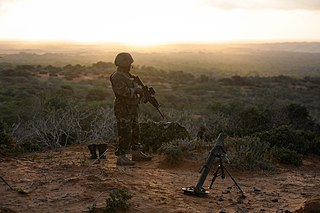
Operation Indian Ocean was a joint military operation between the Somali military, AMISOM and the United States military against the Al-Shabaab militant group aimed at eliminating the remaining insurgent-held areas in southern Somalia. It officially began in August 2014.
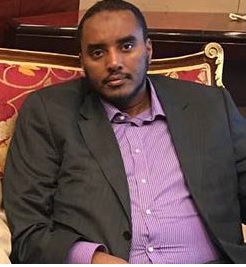
Fahad Yasin Haji Dahir,, commonly known only as Fahad Yasin, is a Somali civil servant and politician, as well as a former journalist. He was also the campaign manager for Mohamed Abdullahi Mohamed "Farmaajo" in the 2017 elections. After the elections, he was appointed Chief of Staff for Villa Somalia and then Director General of the National Intelligence and Security Agency (NISA). Farmaajo subsequently appointed him as his national security advisor.
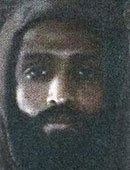
Abdikadir Mohamed Abdikadir, better known as Ikrima, is a terrorist described as one of the most dangerous commanders of the Somali terror organisation Al-Shabaab. He has reportedly been central in the planning of several terror attacks, and responsible for forging links between Al-Shabaab and Al-Qaeda in the Arabian Peninsula (AQAP). He is of Somali ethnicity.
The Tunni are a Somali clan that make up part of the wider Digil-Rahanweyn branch. It is one of the major clans that inhabit in the South West State of Somalia and can also be found in Jubbaland.
Bida or Bido are a clan confederacy based in Baraawe, South West State of Somalia and make up one of the groups part of the "todobo Tol" also known as Bravanese people. Member clans of this clan umbrella can also be found in other confederacies further up the coast in Marka and Mogadishu.
Haatim are a Somali clan from southern coastal cities of Baraawe, Marka, Kismayo and Mogadishu, they can also be found in the hinterland towns in the inter-riverine are of Somalia and further down the Swahili coast. The Haatim clan are synonymous with the town they first settled in, Baraawe and make up one of the groups part of the "todobo Tol" also known as Bravanese people.
'Shanshiyo or Shaanshi is a Banaadiri clan, mainly from the southern coastal cities of Mogadishu, Marka, Baraawe and Kismayo which established communities in the hinterlands in towns such as Baidoa and Diinsoor due to trading.
The 12 Koofi, more commonly known as Reer Marka, are a Somali confederation of clans inhabiting the city of Merca and other southern coastal towns of Somalia.










